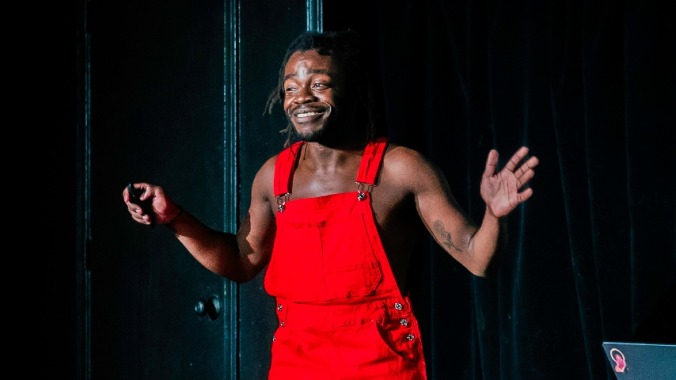Demi Adejuyigbe Is Going To Do One (1) Backflip Has Plenty Laughs, But Fumbles the Dismount
Photo by Josh Goldner
Demi Adejuyigbe has been a mainstay of internet alternative comedy for years now, appearing on dozens of podcasts (as well as hosting a couple himself), going viral with parody theme songs for popular films and TV, and being a staff writer for buzzy hits like The Good Place. His Edinburgh Fringe debut, enticingly titled Demi Adejuyigbe Is Going To Do One (1) Backflip, makes a determined effort to translate his short-form, digital comedy success into an hour of absurd, disarming gold with some big time collaborators backing him; the show is directed by sketch duo BriTANick and is presented by London’s Soho Theatre. But while Backflip makes for a consistent and unexpected hour of alt-comedy, Adejuyigbe’s first Edinburgh show still doubts itself, undermining the comedian’s confident multimedia and musical jokes with a sudden jolt of vulnerability that stops the show from pulling off something fantastic.
As per the title, Demi Adejuyigbe promises to deliver a single backflip at the end of his show, but it’s not just for us audience members—he wants to impress his crush with his acrobatic skills. It’s the type of childlike, attention-grabbing stunt that perfectly suits the performer’s eccentric and scatterbrained persona, funneled into a quasi-presentation that he strides through with only a few line fumbles and breaks in energy. In the extended buildup to the flip, he introduces us to a robot companion (presumably controlled and voiced by one of the members of BriTANick), proposes Racism 2, and performs an entire one-man musical about the Ikea Monkey, which he threatens to transform into a Hamilton-style rap deep into the performance. It’s a series of energetic bits, pinned together by silliness, giving us a commendable and hyper-specific look into the comedy instincts of someone whose art has been defined by the internet.
A word on venues at the Edinburgh Fringe: there are hundreds and hundreds of them, and an artist has no meaningful say on whether or not their venue space will be a complete nightmare, but Adejuyigbe’s 102-seater space suits him very well. His ironic showman physicality takes full advantage of the space, and his engaging stage presence balances a slideshow and music cue-heavy set. In alternative comedy, an intimacy with the audience is crucial—being able to hear individual laughs over a confused crowd and surfing the palpable discomfort of your more abstract bits can be a real weapon in a comedian’s arsenal.
But alienation is not an intended effect for Backflip, and a lot of Adejuyigbe’s jokes—even the most ironic, rug-pulling absurd ones—lean on his exhaustive pop culture knowledge to surprise and amuse us. Herein lies the first problem: the sheer variety of audiences that go to a catchy-sounding early-evening comedy show at the Edinburgh Fringe means that Adejuyigbe’s reliance on referential (usually online) humor can take the wind out of his sails, undercutting the impact of a punchline or running joke by referencing something that, at least in the show I saw, half the audience struggled to recognize.